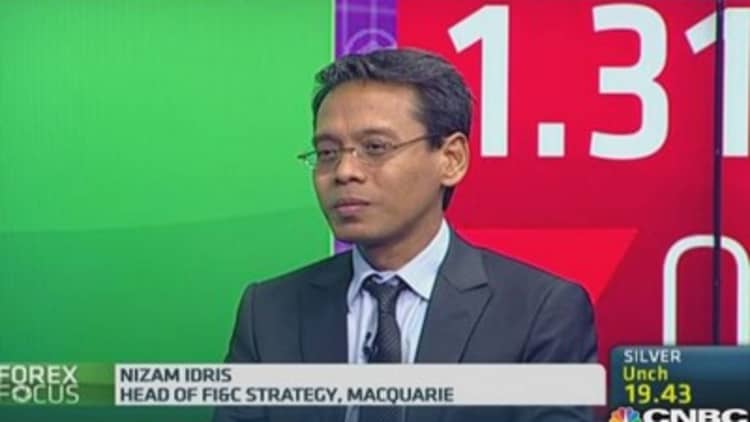The pace of activity in Chinese factories slowed in August, the release of a pair of official purchasing managers' indexes (PMI) on Monday confirmed.
The official (PMI) came in at 51.1 in August, according to the National Bureau of Statistics, a tad below expectations for a reading of 51.2 and down from a 27-month high of 51.7 in July. It remains above the 50-mark which separates expansion from contraction.
The final reading of HSBC's manufacturing PMI for August meanwhile fell to a three-month low of 50.2, a dip from the flash reading of 50.3.
Read More'Perfect storm' tohit China economy in 2016
There was little reaction in Asian stock markets outside of Australia. Sydney shares widened their gains to 0.5 percent, hitting a more than one-week high, while the Australian dollar barely moved.
The PMI figures follow a slew of disappointing economic data – from manufacturing to credit growth – over the past month despite a burst of government stimulus measures to support the economy.
"The industrial sector is suffering from a drop in new lending, which is making it more difficult to operate and invest. The [PMI] data highlights renewed downward pressure on the Chinese economy emerging in the summer, but it also should prompt more policy easing measures from Beijing," said Darius Kowalczyk, senior economist and strategist at Credit Agricole.

Last week, the Bank of America Merrill Lynch said the Chinese government launched a "fresh round of mini-stimulus" to counter growth headwinds, giving banks a larger re-lending quota at lower rates to support the farm sector.
But analysts say using stimulus to artificially prop up the world's second-largest economy isn't sustainable, especially amid signs of a slowdown in the country's key housing sector.
"[China's policymakers] just keep putting bandages over the problems they have. When you try to solve problems with stimulus, that doesn't work - you just crash with too much sugar which you will eventually see in China," said Joe Magyer, senior analyst at The Motley Fool.
Read MoreDid China just announce a new mini-stimulus package?
"We're now seeing the results of that - diminishing returns, productivity seems to be falling [and we're] starting to see softening in prices of real estate. It's really disconcerting, there are statistics that say around 20 percent of homes in China are vacant today... yet there are still more inventories coming online," he added.
China's home prices fell for a third straight month in July. The sector accounts for roughly 15 percent of gross domestic product and directly affects other sectors such as banking and construction.
The economy grew 7.5 percent in the second quarter after logging a 7.4 percent expansion in the three months before, the lowest pace in six quarters. To be sure, most analysts aren't expecting a dramatic slowdown in Chinese growth.
Read MoreChina real-estate: A bubble bursting
"The risk of an imminent hard landing appears small — policymakers have plenty of tools with which to fight a rapid drop off in growth," said Julian Evans-Pritchard, China Economist at Capital Economics, noting that stimulus measures will remain targeted.
"Although we expect them to continue to fine tune policy in response to the incoming data, they have so far stopped short of the kind of stimulus likely to drive another rebound in growth of the kind seen in Q2," he said. "As such we continue to expect a gradual slowdown in coming months."

